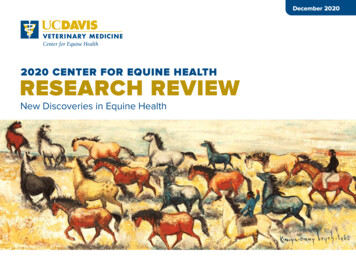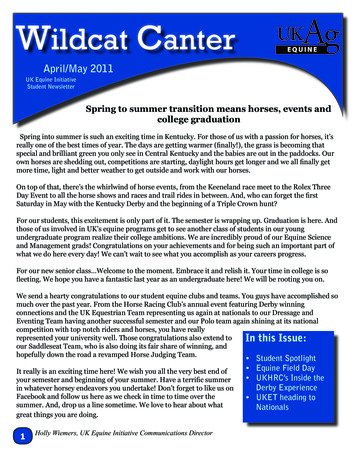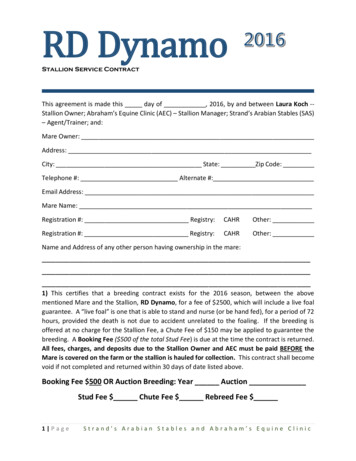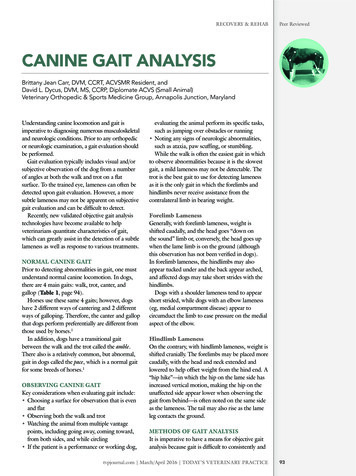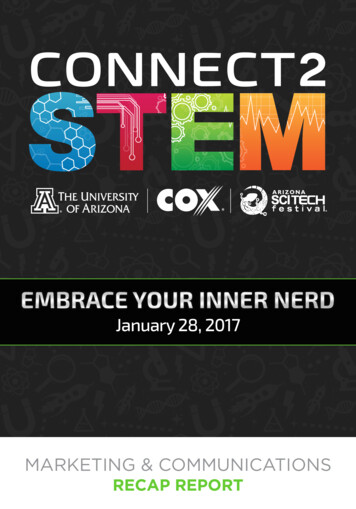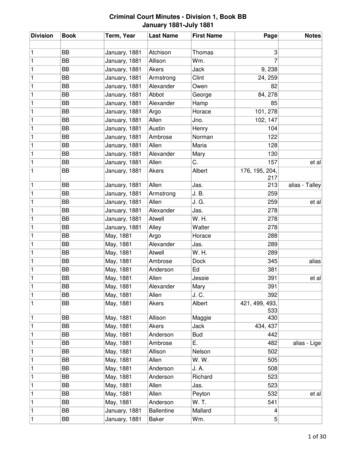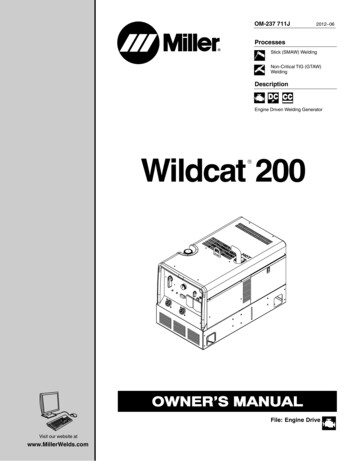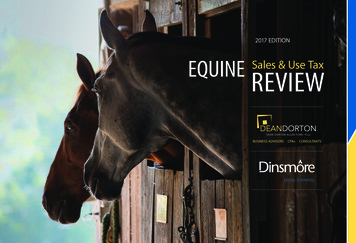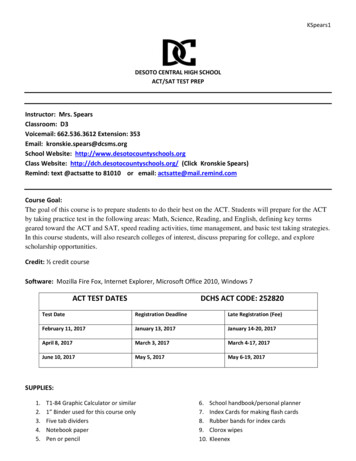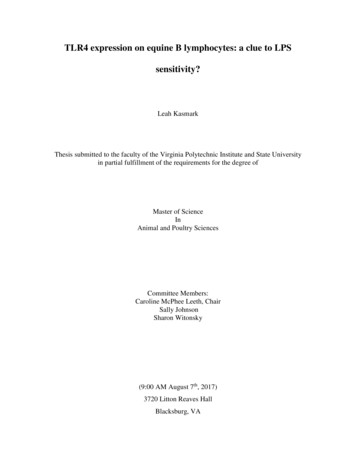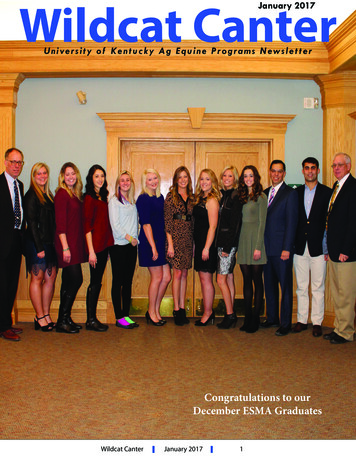
Transcription
Wildcat CanterJanuary 2017U n i ve r s i t y o f Ke n t u c ky A g E q u i n e P r o g r a m s N ew s l e t t e rCongratulations to ourDecember ESMA GraduatesWildcat CanterJanuary 20171
CONTENTSWildcat Canterr5UK’s Equine Program Helps Large Animal Lover Find HerPlace in the Equine IndustryLauren Mullins is a University of Kentucky senior originally from Washington Court House,Ohio. Growing up, Mullins did not have a lot of exposure to the horse industry.UK Alum Takes Advantage of Opportunities in the Industry711Kyle Johnson has worked with horses since high school, but after coming to theUniversity of Kentucky, he became more focused on the Thoroughbred racing and breedingindustry.Program Spotlight-Pamela GrayOriginally, from Baileys Harbor, Wisconsin, Pamela Gray received a bachelor of arts incommunications from the University of Kentucky and a master’s in professional studies inleadership in organizations from the University of Denver.On the cover: Recent graduates at the ESMAgraduation reception.Other features:Total of 28 College Advisors Up for AwardStudent Professionalism SeriesEquine Alumni Chapter Forming in 2017Wildcat Canter6814January 20172
WelcomeThere is a lot of talk about the image and identity, or the brand, of everything from a cup of coffee to an airline.Sometimes people even talk about having a personal brand. This is probably an overused idea, but it is usefulin many ways. Think about Kentucky. A few things come to mind, but regardless of who you talk to, horses areprobably at or near the top of the list. I cannot imagine having a better job than my new position, Director of AgEquine Programs at the University of Kentucky. But horses are more than just the image of Kentucky, they arebig business in the state. And like any brand or identity, that image is strongest if it represents what mostmatters about the person, place or thing. Bad coffee is bad coffee, regardless of the color of the cup or how greatthe company is at social media.In Kentucky, loving horses or anything related to horses is part of the social fabric. You can talk about horses inthe hallway at work; racing is on the television in the sports bars; and world-class equestrian events are availablejust about every week. For horse owners, some of the world’s greatest veterinarians, farriers and trainers are allright at your doorstep. Some of the world’s most famous equine hospitals are in Lexington. And if you have everdreamed of seeing some of the greatest racehorses who have ever lived, they live in Central Kentucky or areburied here in graves marked like some of the most famous statesmen and generals – and depending on thehorse, the comparison may be fair!So, what does that mean to all of us who are lucky enough to live in Lexington and study at UK? This is the timeto explore. If you grew up barrel racing, you owe it to yourself to spend time at Keeneland, watch the races andgo to the sales. If you grew up on a Thoroughbred farm, your time at UK is your opportunity to learn toappreciate the Western disciplines or maybe join the UK Polo Team. The equine industry is big, fragmented anddiverse. One thing that has become clear to me watching people who make a career with horses is that flexibilityis key. People who are now at the top of the industry may have started in racing, gone on to help organizeOlympic equestrian events and then worked for a breed organization.But it is all a part of the equine industry. The way to build appreciationof the horse as an athlete is to understand the flexibility of their skillsand training. Appreciation of the horse and the centrality of the horsein culture and sport is necessary to building a career in the equineindustry.I am blessed to be a part of this excellent program. I hope that I can beworthy of the wonderful organization that has been built in equineprograms and I look forward to continuing to explore the amazinghorse with all of you during your time at UK. Horses are a veryimportant part of the brand and the economy of Kentucky. However, inAg Equine Programs the horse is at the heart of everything we do.Mick PetersonDirector, UK Ag Equine ProgramsWildcat CanterJanuary 20173
January 3-February 27Students permitted to change majorsJanuary 4-20Add/drop for registered studentsJanuary 30-April 28Graduation checks for August andDecember graduatesFebruary 1Last day to drop a courseFebruary 23UK Department of Veterinary ScienceEquine Diagnostic Research SeminarSeries, 3:30-5:30 p.m.UK VDLFebruary 28Last day to apply for August 2017 degreeonlineMASTHEADWildcat Canter Editorial StaffAlexandra Harper, MBA, managing editor, contributing writer, layoutMaddie Regis, contributing writerHolly Wiemers, MA, APR, senior editor, contributing writerWildcat Canter Editorial BoardBob Coleman, PhDdirector of undergraduate studiesCamie Heleski, PhDlecturerElizabeth James, MSlecturer and internship coordinatorMick Peterson, PhDequine programs directorKristen Wilson, MSacademic program coordinatorN212 Ag Sciences Building NorthLexington, KY 40546-0091Office: (859) 257-2226equine@uky.eduwww.equine.ca.uky.eduWildcat CanterJanuary 20174NEWS AND ANNOUNCEMENTSUp co m ing e v e n t s/ d e a d l i n e s:
UK’s Equine Program Helps Large Animal Lover Find Her Placein the Equine IndustryBy Maddie Regis“I had very little experience with horses prior to my time at UK. I never had horsesgrowing up. I knew I wanted to work with horses but the industry in Washington CourtHouse is almost nonexistent. Prior to coming to UK, I knew nothing about horse racing. Ihad never even been to a Thoroughbred race. The only races I had ever experienced werethe harness races at my county fairgrounds,” she said.Despite her lack of experience with horses, Mullins had always loved large animals,especially horses, and had a feeling she wanted to have a career in the horse industry.“I thought, ‘What better place than Kentucky to learn about horses and racing!’” Mullinssaid on why she chose to come to UK.As Mullins learned more about the horse world, she found that she really enjoyedThoroughbreds and the Thoroughbred industry. This led her to her current job at UK,which in turn helped her decide to intern at Eaton Sales.Lauren Mullins at the KeenelandJanuary Sale with a mare namedJUST GOT IN.“My decision to intern at Eaton Sales came after my current manager, Bryan Cassill, suggestedit. I currently work at UK’s Maine Chance Farm and Eaton’s sales coordinator, ShanonLevering, is a graduate of the Maine Chance program. I wanted to gain experience in the sales aspect of the industry and EatonSales offered me that opportunity. Eaton Sales is a highly-respected consignment and they have a wonderful group of peopleworking for them,” Mullins said.The internship gave her an insight behind the scenes of a Thoroughbred sales operation, and as one can expect, there was quite alot to do before, during and after the sales.“During the course of my internship, Eaton participated in various sales. My responsibilities began with assisting in preparationsfor each sale. This included paperwork, putting together sales books and organizing and compiling sales supplies. I also assistedin showings, recordings and hospitality. After each sale I helped with the cleanup and reorganization of the materials inpreparation for the next sale,” Mullins said.“Our internship with Eaton Sales is always a favorite among students,” said Elizabeth James, Lecturer and Internship Coordinator.“Shannon does a great job of giving them behind-the-scenes experience and students like Lauren do a stellar job of working hardand taking it all in.”Mullins had a lot of responsibilities as an Eaton Sales intern, and she said that it taught her a lot.“I learned so much about the business side of the Thoroughbred sales. Before my internship, I had only experienced theThoroughbred sales as a groom/showman. It was eye opening to see the inner workings of the sales and to see what it takes forthem to operate,” she said.“My favorite part of my internship would be tagging along with the Eaton Sales team throughout the sales. Reiley McDonald isthe head of the Eaton Sales team as well as a well-respected individual in the industry. It was an amazing opportunity to workwith him as well as to learn from him. I learned so much just by listening and observing during the sales. Everyone was sowelcoming and eager to share their knowledge,” she said.The Eaton Sales team was as pleased with Mullins as Mullins was with her internship. “Lauren was a great asset to Eaton Salesduring the 2016 sale season. She is extremely self-motivated and dedicated to expanding her knowledge of the Thoroughbredindustry. I hope she enjoyed her internship as much as we enjoyed having her,” saidLevering, Mullins’ internship supervisor.Mullins said she hopes to become a broodmare manager, and working with Eaton Sales gave her a better understanding ofimportant factors to consider when breeding Thoroughbreds.“Working with Eaton Sales gave me the opportunity to better understand what kind of horses buyers are interested in. It allowedme to have a better understanding of desirable matings, stallion statistics as well as desirable and non-desirable conformationtraits. All of which is fundamental when breeding Thoroughbreds,” she said.Mullins will be traveling to Ireland for two weeks after she graduates to learn about the Thoroughbred Industry across the pond.Following that, she hopes to get a job with a Thoroughbred sales or breeding operation.Wildcat CanterJanuary 20175P RO G R A M S P O T L I G H TLauren Mullins is a University of Kentucky senior originally from Washington CourtHouse, Ohio. Growing up, Mullins did not have a lot of exposure to the horse industry.
Source: UK Center for Student SuccessEach year, the University of Kentucky Advising Network recognizes two advisors, one professional advisorand one faculty advisor, with the Ken Freedman Outstanding Advisor Award.The College of Agriculture, Food and Environment boasts 28 Freedman nominees this year, more than anyother college or unit at the University. The college’s nominees, listed below, will be recognized at the KenFreedman Luncheon on February 23.The two awardees will receive a 500 travel grant from UK Student and Academic Support, a unit of the UKDivision of Student and Academic Life. Awardees will also be nominated by the University for theNACADA Region 3 Excellence in Advising Award and for the National Academic Advising AssociationOutstanding Advisor Award.Ken Freedman, the award’s namesake, was one of the founders of the UK Advising Network in 1986 andserved as a professional advisor at UK until his death in 2001.Professional NomineesName Department/UnitJamie DunnCenter for Student SuccessEsther FlemingAgricultural and Medical BiotechnologyAnn LeedAnimal and Food SciencesAvery MaloneRetailing and Tourism ManagementAnissa RadfordDietetics and Human NutritionNatasha SaundersOffice of DiversityLeann SlaughterAnimal and Food SciencesKristen WilsonEquine ProgramsFaculty NomineesName Department/UnitCarmen AgouridisBiosystems and Agricultural EngineeringRoger BrownAgricultural EconomicsRayeCarol CavenderRetailing and Tourism ManagementLorraine GarkovichCommunity and Leadership DevelopmentRyan HargroveLandscape ArchitectureTyler MarkAgricultural EconomicsLeigh MaynardAgricultural EconomicsMartin NielsenVeterinary ScienceSharyn PerryPlant and Soil SciencesMika PryorRetailing and Tourism ManagementMary RossanoAnimal and Food SciencesJack SchiefferAgricultural EconomicsAaron SchwartzDietetics and Human NutritionWill SnellAgricultural EconomicsTammy StephensonDietetics and Human NutritionJason SwansonRetailing and Tourism ManagementKristine UrschelAnimal and Food SciencesStacy VincentCommunity and Leadership DevelopmentScarlett WesleyRetailing and Tourism ManagementMark Williams HorticultureTo learn more about the Ken Freedman Outstanding Advisor Award, including past winners, visit http://www.uky.edu/UGE/network-awards.Wildcat CanterJanuary 20176NEWS AND ANNOUNCEMENTSTotal of 28 College Advisors Up for Award
By Alexandra HarperKyle Johnson has worked with horses since high school, butafter coming to the University of Kentucky, he became morefocused on the Thoroughbred racing and breeding industry.A 2014 graduate of the Equine Science and Managementprogram, Johnson has had several great opportunities in theequine industry. His work experience includes internships atWinstar and Claiborne farms. He spent a season in Australiaas a stallion groom and this past year at Brookdale Farm as abroodmare manager.His responsibilities have ranged from day-to-day care of acouple horses, to overseeing an entire division. Along withthe general care responsibilities, he has also been responsiblefor breeding shed runs, foaling and maintaining vaccinationand deworming schedules.Most recently, Johnson experienced history when he witnessed American Pharoah’s first foal being born.“It was a surreal experience,” Johnson said. “It’s those kind of moments that make the year’s process soworthwhile.“It’s not every day you see offspring of a Triple Crown winner born, let alone the very first offspring of aTriple Crown winner in 30 years,” Johnson said.Johnson and Brookdale’s farm manager split duties for night foaling’s. The night American Pharoah’s foalwas born, the farm manager was on duty.There’s no man more fitting for such a special occasion as this foaling,” Johnson said.Johnson now currently works for Claiborne Farm; working in the foaling barn, assisting with morningteasing rounds with the farm mares and also helping with the afternoon breeding sessions.When asked what Johnson’s advice was to students, he said, “Always be humble and eager to learn.“There are many great peoplewilling to teach and mentor you inthe equine industry, as long as youshow them an eagerness to learnand a willingness to put in the timeand work necessary,” Johnson said.To read more about AmericanPharoah’s foal, visit can-pharoahs-firstfoal-born-versailles/.Photos by Kyle JohsonWildcat CanterJanuary 20177FEATURE STORIESUK Alum Takes Advantage of Opportunities in the Industry
By Elizabeth A JamesThe University of Kentucky Equine Science and Management Undergraduate Degree Program strives to not onlyeducate you about equine science, but also to prepare you for your future career. Part of this preparation includesclassroom guest lectures, hands on labs, requiring an internship before you graduate, exposing you to numerousindustry related careers and, most recently, we have added a series called the Student Professionalism Series tothe Wildcat Canter. The Student Professionalism Series will offer insights and tips to help you effectively preparefor, find, apply to and obtain the career of your choice. For those of you wanting to start your own business oneday, this month we will discuss one area not to skimp on.Talk is cheap, until you hire a lawyerI’m all for saving money. When it comes to my horses, I’ll give Bute to treat lameness before calling the vet;I don’t think twice about giving my own vaccines; and I love to trim my horses’ feet. Who can blame me?Horses are expensive and horse people are notorious for cutting corners. But, the minute you cross overfrom having horses as a hobby to running an equine business, everything changes. For one, you can’t cutcorners with client horses, and for another, there are some areas of your business that you have to be willingto invest in or you will pay for it later. One such area is legal advice.Just mentioning a lawyer is sure to elicit a range of emotions. Lawyer jokes are as commonplace as opinionsabout our legal system. But truth be told, regardless of how you feel about them, when a situation calls for anattorney, there is no substitute. Over the years I have watched many friends launch their own businesses inthe equine industry. I’ve observed even more sign contracts – be they boarding contracts, trainingagreements or partnership deals - without ever having a lawyer look at them or even knowing what they aresigning. Unfortunately, I have also seen deals go south, accidents happen and lawsuits drag on. It isn’t cheapto get good legal advice but it costs far less to protect yourself upfront than to have to pay for it later.If I could give those of you wanting to start your own business one piece of advice from personal experience,it would be to hire a good attorney from the very beginning to write your contracts, read over anything yousign, and give you legal advice pertaining to the potential risks of your business and how to manage them.I am aware that this is costly advice, but I assure you it’s worth it. In the short time that my husband and Ihave owned two equine-related businesses, we have dealt employee issues, client horse issues, businessopportunities, and more. All of them involved contracts, all of them were complicated, and all of them weremade better by an attorney.Your relationship with your attorney is as important to the success of your business as your relationshipwith your veterinarian or feed supplier. Our attorney knows our farm. He wrote our contracts, he knows ourplans, and he is aware of potential problems as soon they arise. Our relationship with him is one of our toppriorities and we make sure he knows it. Because of that, he is always just a phone call or email away. Wedon’t have to set up a meeting or waste time telling him the back story. We have access to legal advice that isspecific to our situation whenever we need it. No more searching onGoogle, asking friends who may not know, or browsing legal websites.Lawyers are like doctors, you don’t want to need one but when you doneed one, you want the best. Investing in legal advice for your businessis not as fun as wrapping wounds, riding a good horse or buying newtack. But it is every bit as important, maybe even more.Wildcat CanterJanuary 20178FEATURE STORIESStudent Professionalism Series
Emily Brollier Curtis, ‘09Head Trainer & Owner of Miramonte EquineBy Maddie RegisWhere is home for you?I was raised in Kansas, but call Kentucky home now.How did you first become involved in the horseindustry?I have ridden my entire life. Throughout college, I workedin the Thoroughbred industry as a groom, theneventually a barn foreman, and then a broodmaremanager. I’ve always had a passion for dressage and I havealways loved to develop young horses.What were your career goals before graduation?Before graduation, I actually had planned on having acareer in the Thoroughbred industry as either a bloodstockagent or a sales coordinator. I had always planned oncontinuing my dressage on the side, with goals ofdeveloping my horse to Grand Prix, but it wasn’t until aftergraduation that I went down the path to become afull-time trainer.Where are you currently employed?I am self-employed, running the company MiramonteEquine.What are your current job responsibilities?As head trainer and owner of Miramonte Equine, myresponsibilities range in everything from training andriding the horses, to teaching lessons and clinics, toselling and marketing horses, to breaking young horses, toorganizing vet and farrier visits to billing and accounting.However, I have recently hired an assistant who has been alife-saver. She is handling a lot of the communications andpaperwork, in addition to riding and exercising horses. Thishas really freed me up to ride more horses and teach morelessons.I would say most of my time is spent riding andtraining. I have some really super clients that have highquality horses. It’s so fun to develop horses along and beable to compete them and watch them shine in theirelement. My goal with each horse is to give themconfidence in their job; whether that is as a competitionhorse for me or as a packer for their owner.Wildcat CanterEmily and her 2016 Retired Racehorse ProjectMakeover mount Dancing Commander.Photo courtesy of Emily Brollier-CurtisWhat led you to this position?Post-graduation, I was fortunate enough to get a taste of almostevery angle of the industry. I held positions that includedbroodmare manager, exercise rider on the track, andcommunications coordinator. During these experiences, I wouldalways keep my personal horse training, hoping to get to GrandPrix. Shortly after graduation, I started having people approachme here and there with horses that had training issues, orneeded confidence. So I would take them on and train themeach day after I would get done with work. Eventually it wentfrom training my horse and one or two others to having sixhorses to ride after I left work each evening. When it crossedinto being too much, I decided to give it a go as a full-timetrainer.How are you currently involved in the horse industry?Currently, I am actually in Holland for a week with clients on abuying trip! But normally, I train and teach 6 days a week andtry to take Sundays off. However, it’s difficult to do thatbecause, I am either showing, teaching clinics or have buyerswho want to come on the weekends.What advice do you have for current equinestudents?I would suggest taking as many “nitty gritty” internships as youcan get, even if they are not directly related to your desiredcareer. For example, by working in the barns at Thoroughbredbreeding farms, I learned TONS of useful medical information.I would also suggest to be realistic about career goals. If youwant to train, understand that it’s long hours and not glorious.You have to hustle really hard. But the reward is well worth thework and lack of sleep. Lastly, be honest. Honesty is key tosuccess no matter what direction your career takes you. Anowner would much rather you tell them that you didn’t havetime to ride their horse, rather than find out later that you liedto them. It builds trust and with trust you can build solidrelationships that can boost your career.January 20179ALUMNI SPOTLIGHTEquine Science andManagementAlumni Profile
www.ca.uky.edu/equineequine@uky.eduBLUEGRASS EQUINEDIGESTUniversity of Kentucky’s EquineResearch NewsletterAward-winning, free newsletterdelivered monthly to your inboxIn partnership with TheHorse.comand sponsor ZoetisCheck out the January issue of the Bluegrass Equine Digest, a free,monthly electronic newsletter dedicated to providing up-to-dateinformation on equine research from the University of Kentucky’sCollege of Agriculture, Food and Environment in collaboration withTheHorse.com and sponsored by Zoetis. This month’s stories canbe found at st/PDF/BED-Jan2017.pdf?utm source Newsletter&utmmedium bluegrass-equine-digest&utm campaign 01-29-2017. How Immunosenescence Impacts Senior Horse CareNocardioform Placentitis ConcernsWinter Stress in LivestockTwo-Year Frangible Pin Study Continueswww.thehorse.comStay Socially Connected to UK Ag Equine ProgramsThe University of Kentucky College of Agriculture, Food and Environment has several equine-relatedsocial media pages featuring the latest news and events information.Follow us on Twitter: UK Ag Equine Programs: @UKAgEquine UK Maxwell H. Gluck Equine Research Center: @UKGluckCenterPrefer Facebook? Like these pages administered by us: University of Kentucky Ag Equine Programs: An overarching framework for all things equine at theUniversity of Kentucky, including the undergraduate degree program, equine-related studentsorganizations, equine research and outreach activities.University of Kentucky Equine Alumni: A community established for the alumni of the University ofKentucky's equine programs, including ESMA, graduate students and clubs and teams' members.University of Kentucky Maxwell H. Gluck Equine Research Center: The mission of the Gluck Centeris scientific discovery, education and dissemination of knowledge for the benefit of the health and wellbeing of horses.University of Kenutcky Horse Pasture Evaluation Program: A service program offered to horsefarms in Kentucky with the goal of overall improved pasture management.Saddle Up SAFELY: A rider safety awareness program sponsored by UKHealthCare, UK College ofAgriculture, Food and Environment and many community organizations. It aims to make a great sportsafer through education about safe riding and horse handling practices.Wildcat CanterJanuary 201710NEWS AND ANNOUNCEMENTSBluegrass Equine DigestCOLLEGE OF AGRICULTURE,FOOD AND ENVIRONMENTwww.ca.uky.edu
Program Spotlight-Pamela GrayP RO G R A M S P O T L I G H TBy Alexandra HarperOriginally, from Baileys Harbor, Wisconsin, Pamela Gray received abachelor of arts in communications from the University of Kentucky anda master’s in professional studies in leadership in organizations from theUniversity of Denver.Gray is currently the senior director of philanthropy for the College ofAgriculture, Food and Environment. She is responsible for all fundraisingthat takes place in the college. Gray works closely with Nancy Cox, deanof the College of Agriculture, Food and Environment, to identify,cultivate and solicit individuals who would like to invest in majorpriorities to advance the land-grant mission. In addition, Gray overseesannual giving and works closely with colleagues in central philanthropyto maximize giving to the college from individuals.“I am happy to return to my alma mater and utilize my more than 20years of experience in philanthropy to impact a place that I hold closeto my heart,” Gray said. “I was a first-generation college student and theyoungest of six. UK gave me the tools and confidence to excel in life andat my chosen profession.”When asked what her favorite part about her job was, Gray said, “Creating a vision for philanthropy that isexciting for those interested to invest in.“I always enjoy meeting and helping people meet their philanthropic goals and their vision for what they wouldlike to support come to a realized vision, whether that is supporting a student and enhancing their experience,supporting our research or supporting a faculty endeavor,” Gray said.When Gray isn’t at work, she enjoys watching the Wildcats and the Green Bay Packers. She loves to hike andtravel to National Parks. In addition, she continues to volunteer as a committee member for the HoustonLivestock Show and Rodeo. She is a member of the Association of Fundraising Professionals, Partnership forPhilanthropic Planning and volunteers to help find homes for homeless pets.Wildcat CanterJanuary 201711
By Kristen WisonWhen first starting at University of Kentucky as a freshman, the day of graduation seemed so far away, butfor 15 of our Equine Science and Management students, this day was finally a reality. In addition to walkingacross the big stage in Rupp Arena in front of their family, friends and peers, graduates also had theopportunity to celebrate on campus beforehand at the Equine Science and Management GraduationReception on Dec. 16, 2016.Graduates and their families gathered with UK faculty and staff over a meal, networking and sharingmemories of their experiences at UK to celebrate this huge accomplishment in their lives. Each student wasrecognized by Bob Coleman, director of undergraduate studies, and received gifts including program swagfrom UK Ag Equine Programs.Many of our graduates have big plans ahead of them. As Ralph Waldo Emerson once said, “Do not go wherethe path may lead, go instead where there is no path and leave a trail.”Each graduate will find his or her own career path within the equine industry and we look forward tofollowing them now as alums of our program making a difference in whatever path they may choose.Wildcat CanterJanuary 201712FEATURE STORIESCongratulations to our 2016Equine Science and Management Graduates!
Kelsey DrewFavorite memory?“WitnessingAmerican Pharoah winthe Triple Crown andseeing him run at theKentucky Derby.”“I chose to come to UKbecause of the equineprogram and becausethere’s no better placeto be for the horsesthan Lexington,Kentucky.”Originally, from Lexington, Kentucky, Abdurrahimchose to come to UK because he received a scholarshipand it had always been his goal since he was young.Originally from Dayton, Ohio, Drew chose UK becauseof the equine program and because there’s no betterplace to be for the horses than Lexington, Kentucky.When asked what his favorite memory was while at UK,he said, “Witnessing American Pharoah win the TripleCrown and seeing him run at the Kentucky Derby.”After graduation, she plans to continue working withThoroughbreds and seeing where it leads her.After graduation, Abdurrahim plans to work with HorseInternational doing business development on exportingand importing horses.Lindsey Sowden“I grew up ridinghorses and when itcame time to decidewhat I wanted to dowith the rest of mylife, I couldn’t thinkof a better place, soI came to UK for theequine program.”Originally, from Cartersville, Georgia, Lindsey Sowdengrew up riding horses and when it came time to decidewhat she wanted to do with the rest of her life, shecouldn’t think of a better place, so she came to UK forthe equine program.When asked what her favorite memory was while atUK, Sowden said, “Becoming so close with many of thepeople in my graduating class.“I was afraid of getting lost in the crowd when I came tosuch a large campus, but the best take away wasmaking lifelong friends and celebrating ourachievements together after we walked across the stage,”Sowden said.Her favorite memory from UK is going to the footballand basketball games with her friends.Tamar WeisburdFavorite memory?“Meeting people whohad the same passionas me and being ableto connect with themfor futureopportunities.”Originally, from Tokyo, Japan, Weisburd chose UKbecause it has the best equine program in the countryand because Lexington is the horse capital of the world.When asked what her favorite memory from UK was,Weisburd said, “Meeting people who had the samepassion as me and being able to connect with them forfuture opportun
Alexandra Harper, MBA, managing editor, contributing writer, layout Maddie Regis, contributing writer Holly Wiemers, MA, APR, senior editor, contributing writer Wildcat Canter Editorial Board Bob Coleman, PhD director of undergraduate studies Camie Heleski, PhD lecturer Elizabeth James, MS lecturer and internship coordinator Series, 3:30-5:30 p.m.
